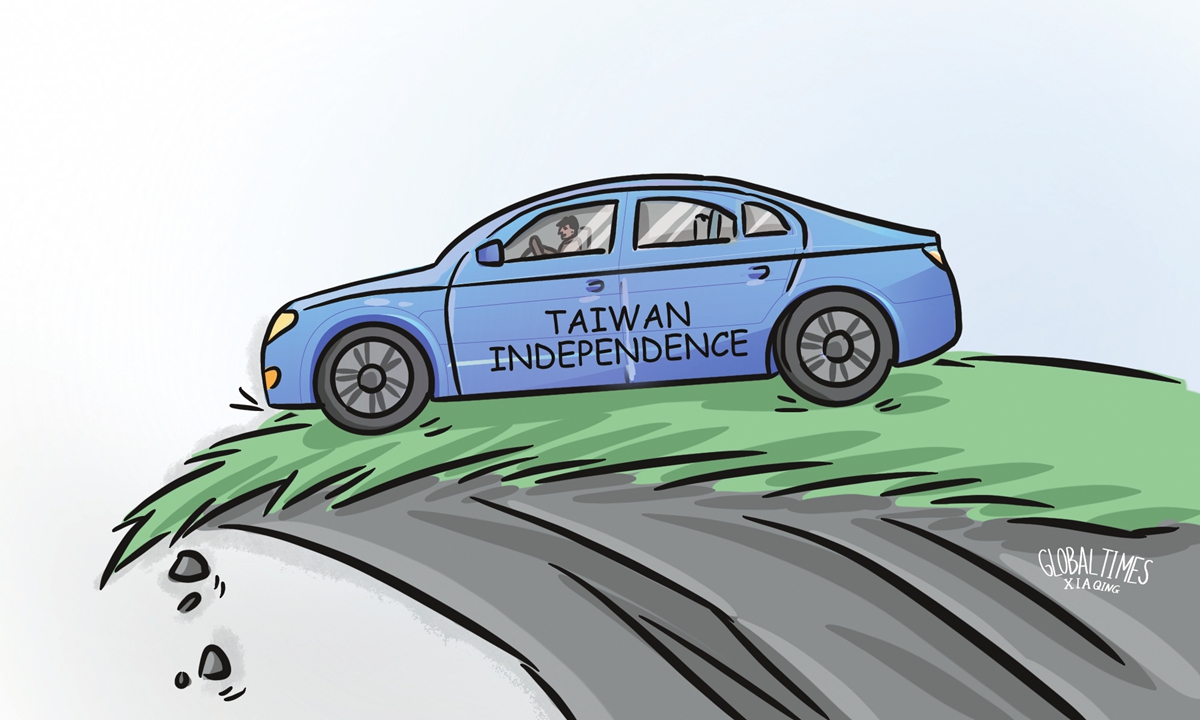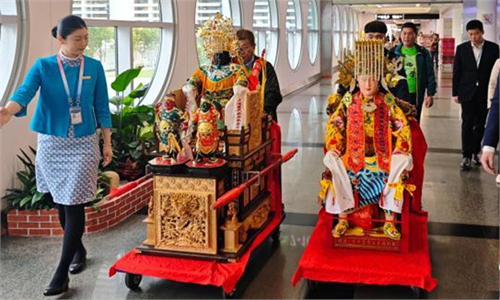
Illustration: Xia Qing/GT
Editor's Note:
Recently, Taiwan's regional secessionist leader Lai Ching-te has not only incited anti-China sentiments and obstructed cross-Straits exchanges and cooperation, but also engaged in terror politics on the island, becoming a sheer manufacturer of trouble, danger and war. The Global Times invited three Chinese experts to share their views on the malicious intentions of Lai and his pro-independence followers. "Should Lai dare to cross the red lines defined in the Anti-Secession Law, he will undoubtedly face the judgment of history and severe legal punishment," wrote one of the experts.
Zhang Wensheng, deputy dean and a professor at the Taiwan Research Institute at Xiamen University
Cross-Straits peace is the expectation of the majority of the people in the Taiwan region, the mainstream public opinion there, as well as the shared wish of the people on both sides of the Taiwan Straits. No people in the world wish for the peaceful reunification of their homeland more than the Chinese. The Chinese government has repeatedly emphasized, "Chinese don't fight Chinese," and it is willing to strive for peaceful reunification with utmost sincerity and greatest efforts, because achieving reunification peacefully is in the best interests of the people on both sides of the Taiwan Straits and the Chinese nation as a whole.
However, pro-independence forces in the Taiwan region and the anti-China forces abroad have spared no effort to obstruct and undermine the process of China's peaceful reunification.
Lai Ching-te is clearly a troublemaker, as not only does he cling to the "Taiwan independence" obsession, but he has also repeatedly raised the "two Chinas" theory, claiming that "China and Taiwan are not subordinate to each other."
National reunification is a historical inevitability. Why does Lai, who frequently talks about "public opinion," intentionally ignore and fail to acknowledge the "greatest consensus" of Taiwan society?
Since taking office, Lai's pro-independence rhetoric and actions have intensified. In July 2024, he seized the opportunity at the annual meeting of the anti-China organization, the Inter-Parliamentary Alliance on China, held in Taiwan, to hype that the UN Resolution 2758 "does not address the political status of Taiwan." In September 2024, he claimed that "China's aim of annexing Taiwan was not driven by concerns for territorial integrity" but to "achieve hegemony." In March, Lai even publicly labeled the Chinese mainland an "external hostile force," and tossed out 17 strategies against reunification, united front efforts and cross-Straits exchanges.
Taiwan is an inalienable part of China's territory, with a clear historical and legal basis. During World War II, the Cairo Declaration, the Potsdam Declaration and the Japanese Instrument of Surrender settled the issue of Taiwan's sovereignty, which was restored to China from Japanese colonial rule in accordance with international law.
The UN Resolution 2758 and the recognition of the one-China principle by countries around the world uphold the outcome of the victory in World War II, safeguard international fairness and justice, and ensure postwar peace. Lai and others, however, are attempting to defy international justice, challenge historical trends, obstruct cross-Straits exchanges and undermine peace across the Taiwan Straits.
Wang Yingjin, director of the Center for Cross-Straits Relations Studies at Renmin University of China
Since taking office, Lai has cracked down on political dissent and created "green terror" on the island of Taiwan. Under his leadership, societal divisions in the region have deepened, the political environment has deteriorated and public discourse has been increasingly stifled. A series of actions taken by the Democratic Progressive Party (DPP) authorities have pushed the island into a dangerous situation of political oppression, judicial abuse, democratic backsliding and institutional disorder. Lai has become an undeniable "manufacturer of danger."
Lai has continually suppressed political opponents, demonizing them and labeling them as "pro-communist" or other derogatory terms to stigmatize dissent. He not only manipulates the media to tightly control the direction of news coverage and manufacture fake public opinion, ensuring that all information serves the DPP's political interests, but also consolidates control over public power by appointing loyalists to key departments. This has steered Taiwan's society toward a more closed direction.
Lai has persistently directed the judiciary to investigate political figures from opposition parties like the Kuomintang and the Taiwan People's Party on charges of corruption or illegality, attempting to weaken his political rivals through judicial means. Those within the DPP who have conflicts of interest with Lai have also been targeted.
Lai has used the recall system for public officials to attack political opponents. Back in 2020, the DPP orchestrated the recall of then Kaohsiung mayor Han Kuo-yu. Now, as party chairman, Lai personally mobilizes support for the recall system, turning it into a political tool to manipulate Taiwan's political landscape.
Lai's push to restore military tribunals aims to aid "green politics" and bring Taiwan back to a "quasi-martial law" state. Under the guise of "security," he has classified ordinary cross-Straits exchanges, academic interactions and civilian contact as "anti-infiltration," not only suppressing the freedom and rights of Taiwan residents but also stifling social vitality and hindering long-term development of Taiwan.
Recently, the Lai authorities have moved to fully suppress voices opposing "Taiwan independence" and supporting reunification, frequently cracking down on pro-reunification and pro-mainland figures.
Lai's actions have exposed his ambitions to implement a "reign of terror" on the island. By suppressing dissent, fueling political divisions and curbing freedom of expression, Lai has become a dangerous force undermining Taiwan's political system and order. The people of Taiwan must recognize the severe harm of Lai's actions and bravely resist his regressive policies.
Wang Shushen, deputy director of the Institute of Taiwan Studies at Chinese Academy of Social Sciences
Peace and stability in the Taiwan Straits serve the interests of people on both sides and the entire Asia-Pacific region. The Chinese mainland is committed to advancing the peaceful and integrated development of cross-Straits relations. However, Taiwan's DPP authorities obstinately pursue a "Taiwan independence" stance through their policies, rhetoric and actions, which is hastening the region's slide toward crisis and conflict.
Currently, Lai's "Taiwan independence" actions have completely undermined the current state of cross-Straits relations and are actively provoking conflict in the Taiwan Straits. Not long ago, his 17 strategies defined the Chinese mainland as a "hostile external force," pushing the "Taiwan independence" agenda toward an inevitable dead end.
On the one hand, this exposes Lai's intransigent "Taiwan independence" ideology. The anti-peace nature of his 17 strategies is laid bare as it reinstates the military tribunal system on the island and forces military personnel to fight for "Taiwan independence." Moreover, the 17 strategies aggressively push forward pan-securitization and cognitive brainwashing, completely restricting normal cross-Straits exchanges, thereby revealing a sinister intent to replace the "peace perspective" with a "war perspective."
On the other hand, American strategic hawks view China as the primary "adversary" challenging America's liberal hegemonic order - a designation far more aggressive than simply labeling China a "rival." They regard the island of Taiwan as a strategic asset and aim to maintain its "permanent separation" from the Chinese mainland, thereby preventing China from achieving complete reunification.
It is precisely for this reason that Lai has comprehensively ramped up military preparedness and bolstered defense, creating a warlike atmosphere. If the Chinese government does not steadfastly curb "Taiwan independence," pro-independence forces will only become more arrogant and dare to push the limits of provocation, ultimately leading to chaos and conflict in the Taiwan Straits.
Lai's obstinate style is pushing him toward becoming a warmonger. His pursuit of "Taiwan independence" not only holds all of Taiwan residents hostage, but also jeopardizes the security order of the entire Asia-Pacific region. There is only one China in the world, and Taiwan is a part of China. The Chinese government must safeguard peace and security in the Taiwan Straits and the Asia-Pacific region by resolutely curbing the separatist forces on the island that subvert peace and foment war. Should Lai dare to cross the red lines defined in the Anti-Secession Law, he will undoubtedly face the judgment of history and severe legal punishment.


